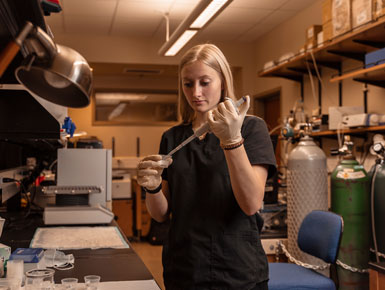USD Student Tiffany Knecht's Research Gives Insight to Fetal Alcohol Spectrum Disorder

While similar studies have been done, none had yet examined the influence of prenatal alcohol on constriction of small arteries in the brain. Knecht's central hypothesis was that in utero alcohol exposure impairs the cellular pathways governing the activity of the vascular smooth muscle.
Knecht got started on her research by reaching out to William Mayhan, Ph.D., dean of basic biomedical science. She was interested in his research and wanted to be involved. She began by applying for the Summer Program for Undergraduate Research in Addiction (SPURA), and then continued her research in Mayhan’s lab after the summer program ended.
“Dr. Mayhan has been my mentor, and he has been doing research for over 35 years,” Knecht said. “He has a lot of insights and has offered an immense amount of support for my research endeavors.”
In Knecht’s project, rats were fed a liquid diet with or without alcohol for the duration of their pregnancies. The rats’ reactivity to three different hormones were examined in both males and females at different age ranges. The group found that specific types of constrictor responses were similar in control rats and rats exposed to prenatal alcohol at both age groups for both sexes. Knecht and her group’s findings may have implications regarding the susceptibility of the brain to certain kinds of damage.
“I am proud of the basic knowledge I have gained through doing this research,” Knecht said.
Knecht presented her research at the 2021 annual SPURA Research Symposium, where she received the second-place award for Outstanding Presentation. She also presented at the 2021 annual meeting of the Midlands Society of Physiological Science where she received the second-place Undergraduate Oral Presentation Award.

